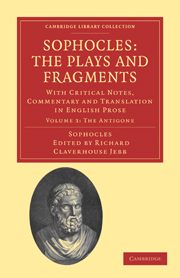PREFACE
Published online by Cambridge University Press: 05 October 2010
Summary
TheAntigone, one of the earliest of its author's extant plays,–the Ajax alone having a rival claim in this respect,–belongs by time, as by spirit, to the very centre of the age of Pericles. At the probable date of its composition, the Parthenon was slowly rising on the Acropolis, but was still some years from completion; Pheidias, a few years older than Sophocles, and then about sixty, was in the zenith of his powers. The traditional, and best, reading of a verse in the ode to Dionysus (v. 1119) suggests the fresh interest in Southern Italy which Athenians had lately acquired by the foundation of Thurii, and recalls the days, then recent, when one of the new colonists, Herodotus, had been in the society of Sophocles. The figure of Antigone, as drawn by the poet, bears the genuine impress of this glorious moment in the life of Athens. It is not without reason that moderns have recognised that figure as the noblest, and the most profoundly tender, embodiment of woman's heroism which ancient literature can show; but it is also distinctively a work of Greek art at the highest.
- Type
- Chapter
- Information
- Sophocles: The Plays and FragmentsWith Critical Notes, Commentary and Translation in English Prose, pp. v - viPublisher: Cambridge University PressPrint publication year: 2010First published in: 1888



